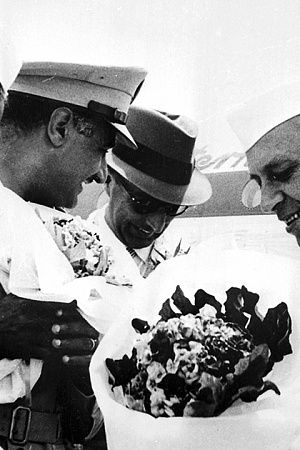Epiphany: The education of an operamane
It is a truth, maybe not universally acknowledged but a truth nonetheless, that epiphanies tend to happen earlier rather than later in one’s life. Soul-shattering, life-changing experiences occur more regularly when the soul is tender enough to be shattered and the life malleable enough to be changed.
I am an excited seven-year-old. Today I am going to what I have been informed is London’s grandest theatre to witness the World’s Greatest Dancer in the ballet Cinderella. I am no theatre-going virgin. I have seen Peter Pan and clapped furiously to bring Tinker Bell back to life and have been to a children’s matinee at Doris Fitton’s Independent Theatre on a return to Australia, but it has been made clear to me that today’s experience will be of a different standard altogether.
Lunch is at the Trocadero in Piccadilly Circus, long since turned into a sort of pinball parlour but then a bastion of rather faded Edwardian grandeur. We walk to the theatre. I am a little surprised that it is right next to a vegetable market, but the building itself lives up to expectations. The uniformed doormen loom majestically over the entrance, the lobby is imposing with its grand staircase, and then there is the auditorium. Rudolf Nureyev, fresh from the grandeur of the Mariinsky and the Paris Opéra was apparently unimpressed by Covent Garden’s décor, but for this seven-year-old, the tiers stretching up into the heavens, the royal box, and the vast red curtain make it the epitome of glamour.
I am given the aisle seat so that I can lean out and not have a view impeded by the adult in front of me. The lights dim, the music starts, the curtain rises, the ballet begins – but the earth does not move. I am not bored or disappointed. The scene changes are magic. I enjoy the Ugly Sisters, they’re funny and I’m pleased that one of them is an Australian like me. I like the World’s Greatest Dancer. She has a nice smile and makes it clear that she is sad to be bullied by her family, excited to be going to the ball and, finally, happy to be with her prince. But she is so old. I do find it rather annoying that just as the story is heating up everything stops and somebody I’ve never seen before and who has no connection to what has been happening dances and then disappears, never to be seen again.
The ballet finishes, the curtain descends, there is a pause, and then it rises to reveal the corps de ballet in formation advancing to the front. The applause begins. This is when I realise that there is a difference between clapping for Tinker Bell and really clapping. This is exciting. The curtain descends again and I’m outraged. Aren’t we going to see the soloists? But a gap in the curtain opens and out they come, some solo, some in pairs. Here come the Ugly Sisters. The audience really like them. The prince arrives, regally acknowledging his reception. Now there is another pause and I am getting worried. Has the World’s Greatest Dancer had an accident? Has she gone home already? At last she appears and now I really hear applause. The house explodes. Adults are standing and shouting. Through the commotion she smiles and curtsies, coolly accepting the adulation. So this is what performers can reduce their audience to. I am vaguely beginning to understand the power of live performance.
As we leave, I am wondering if perhaps next time we could have less ballet and more applause.
I am twelve and going to my second opera. The first was not a success. If you are trying to encourage an eleven-year-old to appreciate opera, perhaps a static, poorly acted, if well-sung, performance of The Flying Dutchman is not the best choice. The second will be Rigoletto, and my dauntless mother is determined not to make the same mistake. For my birthday I am given a recording, the Callas, Gobbi, di Stefano version with the La Scala façade on the cover. My older brother has the score and cajoles me into singing one of the heroine Gilda’s arias, ‘Tutte le Feste’, to his accompaniment. Many years later he tells me it was chosen because the piano reduction was easy, but at the time it didn’t occur to us or our parents that an aria in which the heroine describes her abduction and rape to her father was not perhaps the most suitable vehicle for my boy soprano voice.
This performance is at the much less grand Sadler’s Wells theatre, but the cast is first grade. Rigoletto and his daughter, Gilda, are sung by two young performers who will go on to distinguished international careers: Peter Glossop and Elizabeth Harwood. Because I know the opera, I enjoy the first two acts, but something special happens in the third.
Rigoletto has come to the duke’s palace in search of his daughter. The courtiers try to fob him off, but suddenly the distraught Gilda appears from the duke’s chambers. Rounding on them in fury, Rigoletto drives them off and turns to comfort his daughter. Harwood begins ‘Tutte le Feste’ and I realise the oceans of distance between my amateur warblings and the emotional anguish this wonderful singer can put into the aria without breaking the line. The two singers launch into the passionate ‘vendetta’ duet that ends the act, and I am beginning to understand the combination of technical control and emotional abandon that makes the best opera so powerful. I have become an opera addict for life.











Leave a comment
If you are an ABR subscriber, you will need to sign in to post a comment.
If you have forgotten your sign in details, or if you receive an error message when trying to submit your comment, please email your comment (and the name of the article to which it relates) to ABR Comments. We will review your comment and, subject to approval, we will post it under your name.
Please note that all comments must be approved by ABR and comply with our Terms & Conditions.